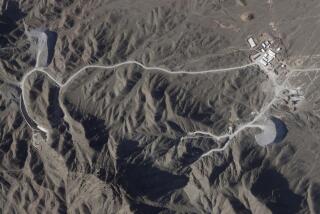Wise Up, Mr. Kadafi : He’s foolish if he ignores U.S. threat against his toxin factory
- Share via
For the last four years Libya has been building what CIA Director John Deutch has described to a congressional committee as “the world’s largest underground chemical weapons plant,” and for nearly all of that time the United States has been trying to persuade equipment suppliers and technicians in other countries not to contribute to the project. But construction continues on a huge chamber carved into a mountain near Tarhunah, about 35 miles southeast of Tripoli. When it’s finished, according to some accounts, the factory might prove invulnerable to all but direct nuclear attack.
Now Defense Secretary William Perry has publicly warned that the United States won’t allow the factory to become operational, and he pointedly declined to rule out using force to back up that threat. He has further hinted that such an attack could come sooner--possibly within the next year or so, before the plant is finished--rather than later when all the equipment for producing nerve gas and other toxins is in place in the thickly protected site.
Such explicit public threats from senior U.S. officials are rare. That Perry went on the record unmistakably signals that the Clinton administration regards what Libyan dictator Moammar Kadafi is up to as a grave international provocation.
In 1990 the United States issued a similar warning about another Libyan chemical weapons plant, at Rabta. That plant was shut down, but its equipment was stored and now seems earmarked for Tarhunah. Earlier, in 1986, U.S. planes attacked targets in Tripoli and Benghazi in retaliation for Libyan terrorism. The memory of that episode might suggest to Kadafi that it would be imprudent indeed to dismiss Perry’s words as mere bluster or bluff.
Chemical weapons have the singular purpose of killing people, indiscriminately and often over a wide area. They are banned as a battlefield weapon, a legality that hasn’t prevented a tyrant like Saddam Hussein from using them against civilian dissidents in Iraq.
An arsenal of such weapons, mounted on Scud or other missiles, could give Kadafi a potent means to intimidate or blackmail his neighbors. In addition, small amounts of toxins handed over to Libya’s terrorist clients could spread the threat of mass murder throughout the world.
Washington has begun a campaign to muster international opposition to the Libyan chemical weapons operation. In the end, it may still find itself with no choice but to act on its own against this undoubted danger.
More to Read
Sign up for Essential California
The most important California stories and recommendations in your inbox every morning.
You may occasionally receive promotional content from the Los Angeles Times.













